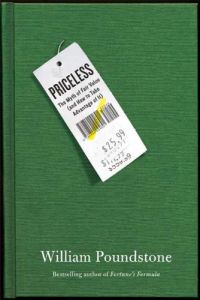Join getAbstract to access the summary!

Join getAbstract to access the summary!
William Poundstone
Priceless
The Myth of Fair Value (and How to Take Advantage of It)
Hill and Wang, 2010
What's inside?
Understanding how pricing tricks manipulate you into spending money: priceless.
Recommendation
You might think you’re a tuned-in consumer and immune to the tricks and gimmicks marketers deploy to get you to buy their products for top prices. But beware, says prolific business author William Poundstone: Your brain is keeping you from making rational cost decisions. This tour of the latest information on pricing techniques is well worth its price tag. Heed his information on the behavioral science that explains the flaws in the heuristics (rules of thumb) that keep shoppers and negotiators from being completely rational, and therefore, completely sharp. getAbstract recommends Poundstone’s smart facts, research and insights to every consumer or business manager who wants the best deal at the right price and thus needs to know what the right price is.
Summary
About the Author
William Poundstone is the author of several business books including Fortune’s Formula and How Would You Move Mount Fuji?



















Comment on this summary